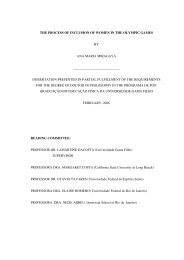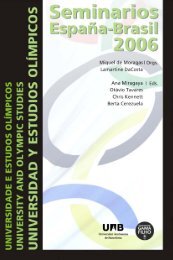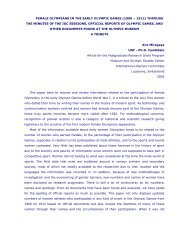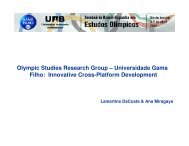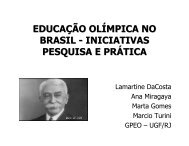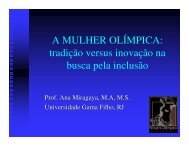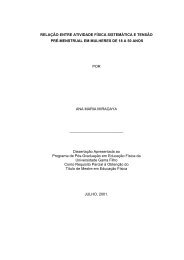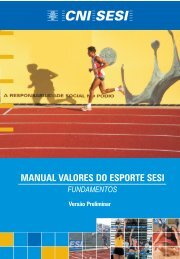- Page 1 and 2:
Meio ambiente, esporte, lazer e tur
- Page 3:
DIREITOS AUTORAIS E CÓPIAS A prese
- Page 6 and 7:
153 159 171 181 193 195 205 215 219
- Page 8 and 9:
361 375 Ecoturismo: discurso, desej
- Page 10 and 11:
2000 Ana Cristina P. C. de Almeida,
- Page 12 and 13:
2001 Alcyane Marinho DA BUSCA PELA
- Page 14 and 15:
exame adicional de características
- Page 16 and 17:
dência cultural de colonos alemãe
- Page 18 and 19:
1968 João Lyra Filho publica neste
- Page 20 and 21:
ases para emendar a Carta Olímpica
- Page 22 and 23:
e Kristine Toohey, da Universidade
- Page 24 and 25:
verificação prática de propostas
- Page 26 and 27:
de comprovações empíricas e revi
- Page 29 and 30:
English forewords and review Resear
- Page 31 and 32:
philosophical arguments. On the oth
- Page 33 and 34:
Ano: 1967 Publicação original: li
- Page 35 and 36:
somados aos 30 litros de água das
- Page 37 and 38:
é uma modificação do líquido ex
- Page 39 and 40:
observadores de SINGER (1931), TROM
- Page 41 and 42:
EFEITOS DO CALOR-UMIDADE NO EXERCÍ
- Page 43 and 44:
HABITUAR: é a alteração de refle
- Page 45 and 46:
REAÇÃO METEOROTRÓPICA = INTENSID
- Page 47 and 48:
ensinamentos de RUDDER (1952), TROM
- Page 49 and 50:
Portanto conclui-se que esforços c
- Page 51 and 52:
[Fim p. 72 - Continua dois parágra
- Page 53 and 54:
com a pesquisa da influência dos f
- Page 55 and 56:
PULSAÇÃO EM REPOUSO - BATIMENTOS/
- Page 57 and 58:
C) Conclusões A viabilidade de um
- Page 59 and 60:
A gradação para chegar até este
- Page 61 and 62:
3. O fator temperatura-umidade é o
- Page 63:
13. A observação dos fatos corrob
- Page 66 and 67:
Brazilians athletes will need a lar
- Page 68 and 69:
[p. 1] ACLIMATAÇÃO O principal pr
- Page 70 and 71:
zadas no México destacam a import
- Page 72 and 73:
Acima desses valores não seria com
- Page 74 and 75:
às crises de aclimatação. Os mes
- Page 76 and 77:
ase comparações estatísticas ent
- Page 78 and 79:
tros relevantes de SCANO (1967) ent
- Page 80 and 81:
egiões elevadas e chegada ao local
- Page 82 and 83:
Na verdade, a colocação dos termo
- Page 84 and 85:
A Cidade do México - México D.F.
- Page 86 and 87:
nos alvéolos que provoca a deterio
- Page 88 and 89:
convergente e mais preciso nos é o
- Page 90 and 91:
populacional (RIO DE JANEIRO, MINAS
- Page 92 and 93:
tratamente, regressão da personali
- Page 94 and 95:
• os efeitos de jogos nas subsede
- Page 96 and 97:
preferência entre as refeições.
- Page 98 and 99:
Física do Exército introduziu a C
- Page 101 and 102:
Ano: 1983 Publicação original: li
- Page 103 and 104:
Além disso, só nos resta repetir
- Page 105 and 106: Para uma melhor interpretação é
- Page 107 and 108: Ano: 1987 Publicação original: fo
- Page 109 and 110: cialmente como resultado de valores
- Page 111 and 112: Neste contexto, não há exagero em
- Page 113 and 114: melhores na sua especialidade em â
- Page 115 and 116: ensão das contradições do despor
- Page 117 and 118: Ano: 1992 Publicação original: Ca
- Page 119 and 120: mental permeia a cultura do limiar
- Page 121: Portanto, a associação da ética
- Page 124 and 125: entanto, são esses mesmos aspectos
- Page 126 and 127: O TURISMO E O MEIO NATURAL: A PAISA
- Page 128 and 129: A avalanche de turistas e veranista
- Page 130 and 131: O TURISMO E A SUBJETIVIDADE: O SENT
- Page 133 and 134: Ano: 1996 Publicação original: re
- Page 135 and 136: BRAMANTE citado por VALENTE et. all
- Page 137 and 138: mo século, reconhecendo algumas ma
- Page 139 and 140: Ano: 1996 Publicação original: ar
- Page 141: a esse antigo processo de devastaç
- Page 144 and 145: As viagens de lazer e conhecimento
- Page 146 and 147: Surgem questões acerca do fenômen
- Page 148 and 149: A ecologia é entendida como uma re
- Page 150 and 151: serem levados em consideração, po
- Page 152 and 153: e que determinaram feições difere
- Page 154 and 155: For this reason, as of 1992 sport h
- Page 158 and 159: this collection started out from th
- Page 160 and 161: In other words, sport might b e und
- Page 162 and 163: By an appraisal of simple “antite
- Page 164 and 165: of human life. Myth is the embodime
- Page 166 and 167: (h) Environmental impact control by
- Page 168 and 169: oriented practices. To foster this
- Page 170 and 171: developed in the environmental or n
- Page 172 and 173: eportagens, em jornais, livros e re
- Page 174 and 175: um aliado do meio natural que vive
- Page 176 and 177: ultimamente, a própria natureza é
- Page 178 and 179: grupos. Neste sentido, Maffesoli 19
- Page 180 and 181: 10 Para estas colocações, Vanreus
- Page 182 and 183: Essa proposta, justifica-se, tendo
- Page 184 and 185: te”. (p.14); podemos referendar e
- Page 186 and 187: ponto da exaustão indesejável. Ce
- Page 188 and 189: Diante disso, Boff (1999, p.17) arg
- Page 190 and 191: Grün (1996, p.12), reforça esta i
- Page 193 and 194: Ano: 1999 Publicação original: te
- Page 195 and 196: Ano: 1999 Publicação original: an
- Page 197 and 198: A promoção do evento foi uma inic
- Page 199 and 200: Ainda a nos dar suporte, temos o Ar
- Page 201 and 202: com os participantes. Essa oficina,
- Page 203 and 204: Após o encerramento de todas as es
- Page 205 and 206: Ano: 1999 Publicação original: an
- Page 207 and 208:
como elas se manifestam, a reflexã
- Page 209 and 210:
“Vivenciar o lazer enquanto possi
- Page 211 and 212:
único e desfrutar do encanto e das
- Page 213 and 214:
monitores buscassem melhor informar
- Page 215 and 216:
Ano: 1999 Publicação original: ar
- Page 217:
autenticidade. Essas característic
- Page 220 and 221:
Esse segmento é reconhecido como e
- Page 222 and 223:
eles, comportamentos de admiração
- Page 224 and 225:
atraem mais, quando se torna pesada
- Page 226 and 227:
Essas práticas promovem vivências
- Page 228 and 229:
um chão de nuvens quase a seus pé
- Page 230 and 231:
As palavras do ator evidenciam que
- Page 232 and 233:
Pós-graduação Stricto sensu em E
- Page 234 and 235:
dados quantificáveis foram analisa
- Page 236 and 237:
Última fronteira para a conquista
- Page 238 and 239:
convidados não mais a observar o q
- Page 240 and 241:
do que a explicação ou a identifi
- Page 242 and 243:
Entusiasmo, de sua presença ou aus
- Page 244 and 245:
forma. A partir dessas atividades p
- Page 246 and 247:
Japão O Japão destaca-se por sua
- Page 248 and 249:
volvido são adaptações da metodo
- Page 250 and 251:
7 O grupo é dividido em pares: um
- Page 252 and 253:
Parker (1978, p. 176) também se oc
- Page 254 and 255:
um problema para si mesmo e um tran
- Page 256 and 257:
Tais critérios justificam-se por s
- Page 258 and 259:
ANÁLISE DOS MOMENTOS DA TÉCNICA D
- Page 260 and 261:
Quadro 2: Período provável de oco
- Page 262 and 263:
porcionando informações sobre as
- Page 264 and 265:
Há de se inovar através do acompa
- Page 266 and 267:
espaços e a revitalização dos es
- Page 269 and 270:
Ano: 2000 Publicação original: Di
- Page 271 and 272:
Partindo desse princípio, Melo e A
- Page 273 and 274:
informações e dados, bem como a a
- Page 275 and 276:
e/ou Recreação das IES da Região
- Page 277 and 278:
objetivos refere-se “a melhoria d
- Page 279 and 280:
Em síntese, observou-se que a Educ
- Page 281 and 282:
• Estimular os cuidados no acesso
- Page 283 and 284:
• Desenvolver estudo de viabilida
- Page 285 and 286:
IMPACTOS POSITIVOS Questionados qua
- Page 287 and 288:
estratégias de dinamização utili
- Page 289 and 290:
Ano: 2000 Publicação original: ar
- Page 291 and 292:
Nelson C. Marcellino (1990:28) suge
- Page 293 and 294:
O atrelamento do lazer ao uso de eq
- Page 295 and 296:
também as diferenças de classes e
- Page 297 and 298:
grandes centros urbanos, vitalizand
- Page 299 and 300:
Ano: 2000 Publicação original: te
- Page 301 and 302:
A motivação ambiental é represen
- Page 303 and 304:
2. Em qualquer tipo de atividade h
- Page 305 and 306:
primeiro, quando a atividade a ser
- Page 307 and 308:
O Dia Nacional da Limpeza é uma pr
- Page 309 and 310:
Naquilo que foi abordado, é pertin
- Page 311 and 312:
Ano: 2001 Publicação original: ar
- Page 313 and 314:
pagarem uma taxa de inscrição par
- Page 315 and 316:
Conforme entrevistas realizadas ao
- Page 317 and 318:
As atividades esportivas atuais, co
- Page 319:
9 Do ponto de vista de alguns crít
- Page 322 and 323:
duradouros, justamente pela relaç
- Page 324 and 325:
caso, entendemos as tradições lú
- Page 326 and 327:
necessita de um modelo para dar con
- Page 328 and 329:
[...] Quadro 3 - Respostas: Feirinh
- Page 331 and 332:
Ano: 2001 Publicação original: tr
- Page 333 and 334:
the UNDP, putting forward the major
- Page 335 and 336:
and the development of values can b
- Page 337:
THE RESULTS […] DISCUSSION […]
- Page 340 and 341:
países. Contomitantemente, nas úl
- Page 342 and 343:
fundamentais na formação integral
- Page 344 and 345:
história. “Instrumentos” music
- Page 346 and 347:
se de tempos, espaços e novas pers
- Page 349 and 350:
Ano: 2002 Publicação original: ar
- Page 351 and 352:
O lazer não tem sido o mesmo, nem
- Page 353 and 354:
FUNÇÕES DO LAZER No oferecimento
- Page 355 and 356:
Localização: em áreas urbanas, d
- Page 357:
Exemplos: hotéis de lazer, resorts
- Page 360 and 361:
de acordo com as peculiaridades do
- Page 362 and 363:
experiência humana? A floresta sim
- Page 364 and 365:
os de sociedade, com os membros da
- Page 366 and 367:
trazem embutidas uma lógica perver
- Page 368 and 369:
Uma das principais definições, a
- Page 370 and 371:
televisão e frigobar no quarto, um
- Page 372 and 373:
Se a própria população local est
- Page 375 and 376:
Ano: 2002 Publicação original: li
- Page 377 and 378:
sição em direção a um DS é din
- Page 379 and 380:
ímpar para enfatizar a importânci
- Page 381 and 382:
sociedade sustentável baseia-se em
- Page 383 and 384:
primeira abordagem tais “fatos”
- Page 385 and 386:
valor a causa ambiental ao patrocí
- Page 387:
3 PNUMA; Membro da Comissão Esport
- Page 390 and 391:
do corpo feminino e das demais dife
- Page 392 and 393:
abre sua obra interpelando as ciên
- Page 394 and 395:
GÊNERO E COMPLEXIDADE: PARADIGMAS
- Page 396 and 397:
frequentemente foram apresentadas c
- Page 398 and 399:
ficação do lugar em que estão as
- Page 400:
10 Citado por Peter Russel em O des



